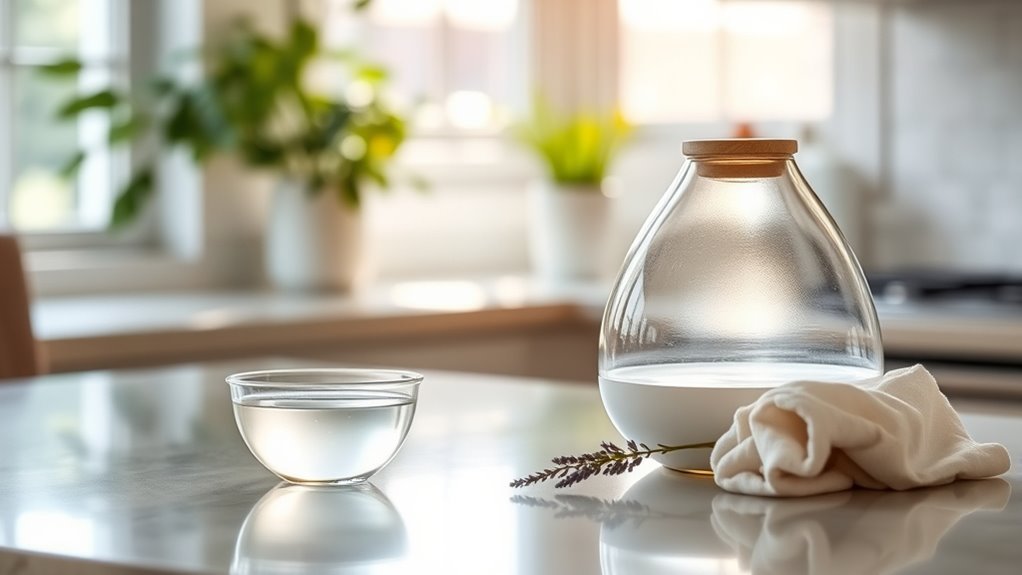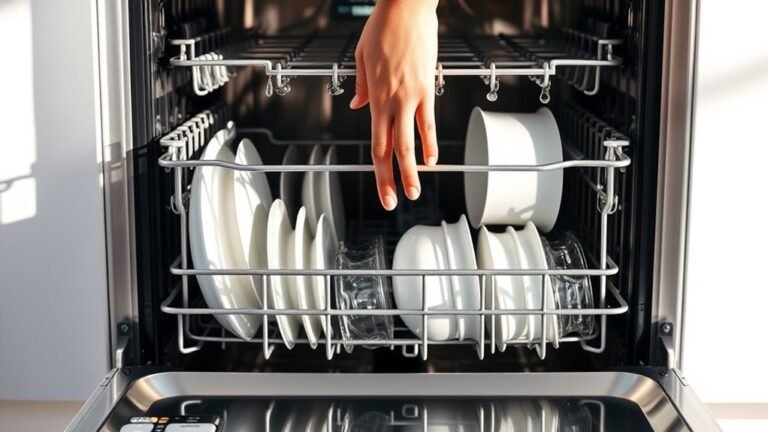How to Clean and Maintain Essential Oil Diffusers
You should clean your essential oil diffuser regularly to keep it working well and smelling fresh. Use mild soap, water, and white vinegar to wipe down the tank and ultrasonic plate gently. Empty and dry your diffuser after every use to avoid residue buildup and mold growth. Deep clean weekly if you use it often, or monthly otherwise. Proper care prevents noise, clogs, and damage. There are simple tips and routines to help you maintain your diffuser perfectly.
Understanding Different Types of Essential Oil Diffusers
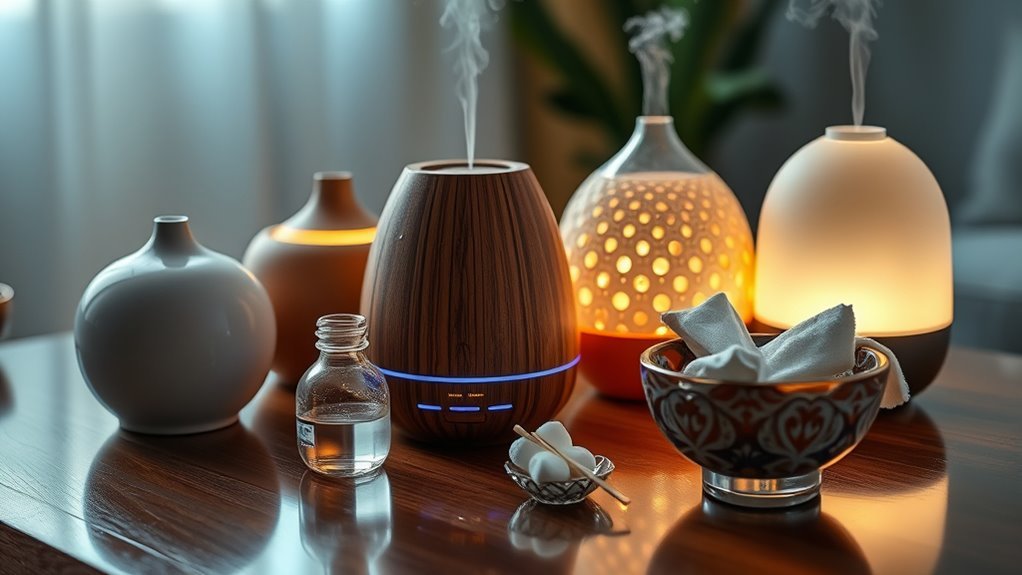
Before you start cleaning, it’s helpful to know the different types of essential oil diffusers you might have. Understanding these types of diffusers helps you maintain them properly, extending their life and keeping your space fresh. You’ll find ultrasonic diffusers that use water and vibrations, nebulizing diffusers that release pure essential oils without water, heat diffusers that gently warm oils, and evaporative diffusers that rely on air flow. Each type uses different diffuser materials, from glass and plastic to ceramic and wood, which means cleaning approaches can vary. Knowing your diffuser’s materials helps you choose the right cleaning method without damaging it. By recognizing your diffuser’s type and materials, you’ll gain freedom to keep it performing at its best, enhancing your environment effortlessly.
Why Regular Cleaning Is Important
Knowing the type and materials of your diffuser gives you a solid foundation, but keeping it clean is just as important to guarantee it works well. Regular cleaning prevents buildup of old oils and residue, which can clog your device and reduce its efficiency. When your diffuser is clean, you maintain the purity and oil quality, ensuring every session delivers the full health benefits you expect. Neglecting cleaning not only hampers performance but can also breed bacteria or mold, risking your well-being. By staying on top of maintenance, you keep your diffuser running smoothly and protect your freedom to enjoy invigorating, therapeutic aromas whenever you want. Regular cleaning isn’t just upkeep—it’s key to preserving both your diffuser’s life and the quality of your experience.
Gathering the Right Cleaning Supplies
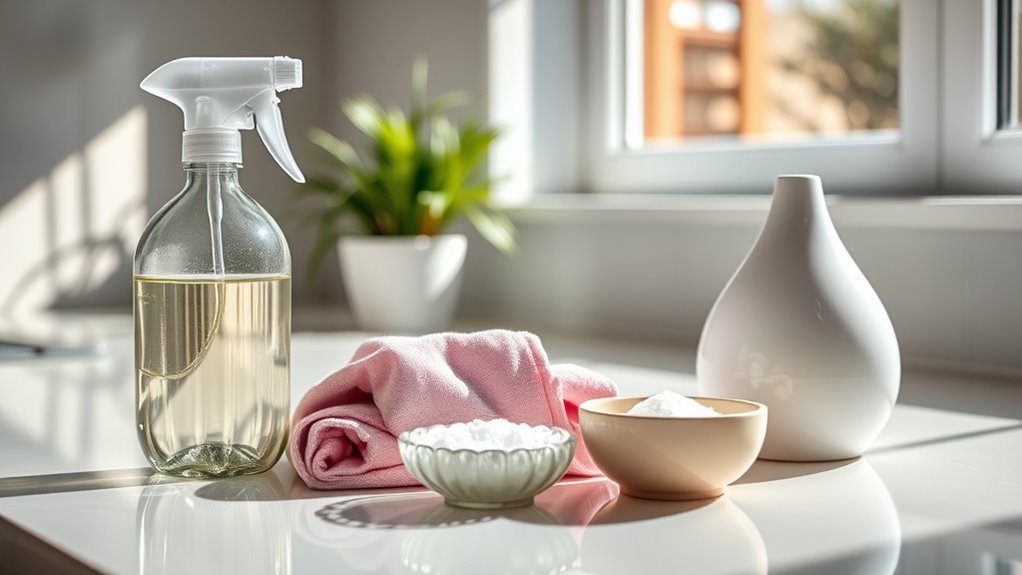
To clean your essential oil diffuser effectively, you’ll need a few basic supplies that are easy to find around the house or at your local store. Having the right cleaning solutions and essential tools on hand makes the process quick and hassle-free, giving you more freedom to enjoy your diffuser’s benefits.
Here’s what you’ll need:
- Mild dish soap – a gentle cleaning solution to remove residue without damage.
- White vinegar – a natural disinfectant for deeper cleaning and deodorizing.
- Cotton swabs or soft cloth – essential tools for reaching tight spots and delicate parts.
- A small brush or toothbrush – perfect for scrubbing away buildup in crevices.
Gather these items beforehand, and you’ll be ready to keep your diffuser fresh and working smoothly.
Step-by-Step Guide to Cleaning Your Diffuser
With your cleaning supplies ready, you can start freshening up your diffuser. Different diffuser materials require specific cleaning techniques to keep them running smoothly. Here’s a simple guide to follow:
| Schritt | Action |
|---|---|
| 1 | Unplug and empty water tank |
| 2 | Wipe inside with a soft cloth and vinegar |
| 3 | Use cotton swabs for small parts |
| 4 | Rinse with clean water |
| 5 | Dry completely before use |
Tips for Preventing Residue Build-Up
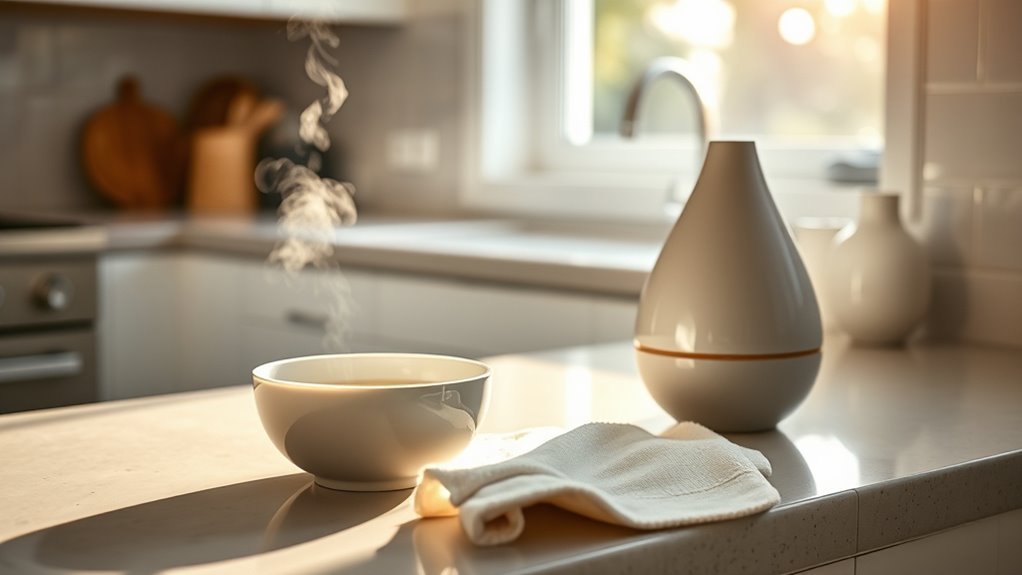
Although regular cleaning is essential, preventing residue build-up in your diffuser starts with a few simple habits you can easily adopt. Mastering residue prevention means making smart choices and staying consistent. Here’s how you can keep your diffuser running freely:
- Choose high-quality oils with pure ingredients—good oil selection reduces sticky residues.
- Use the recommended amount of oil; overfilling leads to excess buildup.
- Empty the water tank and wipe it dry after each use to avoid lingering deposits.
- Run your diffuser with plain water and a few drops of vinegar periodically to break down oils naturally.
How Often Should You Clean Your Diffuser?
You should clean your diffuser daily to prevent residue build-up and maintain its performance. A deeper cleaning once a week helps remove any stubborn deposits. Pay attention to signs like reduced mist output or unusual smells, which mean it’s time for a thorough clean.
Daily Cleaning Routine
If you want your essential oil diffuser to work efficiently and last longer, you should clean it regularly. Daily maintenance is key to keeping your device running smoothly without hassle. Here’s a simple routine using effective cleaning techniques:
- Unplug the diffuser and empty any leftover water and oils.
- Wipe the water tank with a soft cloth dampened with water and mild soap.
- Use a cotton swab dipped in vinegar to clean the ultrasonic plate or mist outlet.
- Let all parts dry completely before reassembling.
Weekly Deep Maintenance
While daily cleaning keeps your diffuser running smoothly, a weekly deep maintenance is essential to prevent buildup and guarantee peak performance. When you set aside time for deep cleaning, you’re freeing your diffuser from oil residue and mineral deposits that daily wipes can’t fully remove. Start by unplugging your device and emptying any remaining water. Use a cotton swab dipped in white vinegar to scrub the ultrasonic plate or mist nozzle gently. Afterwards, rinse with clean water and dry thoroughly. These maintenance tips will not only extend your diffuser’s lifespan but also ensure each mist delivers the pure fragrance you love. By making weekly deep cleaning a habit, you maintain your freedom to enjoy fresh, uninterrupted aromatherapy anytime you want.
Signs It Needs Cleaning
Though regular cleaning keeps your diffuser in prime condition, certain signs can tell you when it’s time for a thorough cleanse. Paying attention to these cues helps maintain peak performance and extends your diffuser’s lifespan. Here are four key indicators signaling it’s time to adjust your cleaning frequency:
- Visible oil residue buildup inside the reservoir or on the ultrasonic plate.
- Diffuser emits a weaker mist or stops misting altogether.
- Unpleasant or strange odors linger despite changing oils.
- Water doesn’t disperse evenly, causing uneven diffusion.
If you notice any of these, don’t wait—clean your diffuser thoroughly. Sticking to a consistent cleaning frequency prevents these issues, letting you enjoy your essential oil freedom without interruption.
Troubleshooting Common Diffuser Issues
If your diffuser isn’t producing mist or starts making unusual noises, it’s usually a sign that it needs cleaning or a quick check-up. You’ll want to inspect for buildup or blockages that could be affecting its performance. Let’s look at how to fix these common problems so your diffuser works smoothly again.
Diffuser Not Mist
Even when you’ve filled your diffuser with water and essential oils, it might not produce mist as expected. Mist issues can be frustrating, but with some simple diffuser troubleshooting, you can get your device back to freedom-enhancing performance quickly. Here’s what to check:
- Water Level: Verify you haven’t exceeded the max fill line; too much or too little water can stop mist.
- Oil Concentration: Too much essential oil can clog the ultrasonic plate, preventing mist.
- Ultrasonic Plate: Clean this tiny component regularly; buildup blocks mist production.
- Power Source: Confirm your diffuser is plugged in securely and the power is on.
Unusual Noises
Strange sounds coming from your diffuser can be distracting or signal a problem. If you notice unusual sounds or excessive diffuser vibrations, it’s often a sign that something’s off. First, check if the diffuser is placed on a stable, flat surface—uneven ground can cause vibrations and noise. Also, verify the water level isn’t too low or too high, as this affects the misting mechanism and can create odd sounds. Residue buildup inside the diffuser may also lead to unusual noises, so regular cleaning is key. If you’ve cleaned it and the sounds persist, inspect the fan or motor for debris or damage. Addressing these issues will help you enjoy your diffuser’s freedom without unwanted noise distractions.
Häufig gestellte Fragen
Can Essential Oil Diffusers Be Used With Any Type of Essential Oil?
You might think all oils work with any diffuser, but that’s not quite true. Oil compatibility varies depending on diffuser types—ultrasonic models prefer pure, water-soluble oils, while nebulizers handle thicker oils better. Using the wrong oil can clog or damage your device. So, to keep your freedom of choice and your diffuser running smoothly, always check which oils your diffuser supports. That way, you enjoy every scent without restrictions or worries.
Are There Specific Oils That Can Damage My Diffuser?
You’ll want to be mindful of oil compatibility with your diffuser materials because some oils can damage certain diffusers. For example, citrus oils like lemon or orange are acidic and might degrade plastic parts over time, while thicker oils like patchouli can clog the system. If you crave freedom in your choices, check your diffuser’s manual to see which oils work best with its materials, so you enjoy your scents without risking damage.
How Do I Store My Diffuser When Not in Use for Long Periods?
For flawless diffuser storage and long-term care, first, firmly flush the fragrance reservoir to remove remnants. Then, find a fresh, dry, and dust-free domicile for your diffuser to avoid damage. Finally, fully dry before faithfully folding it away in a fabric pouch. This careful care gives you freedom from worries and guarantees your gadget’s glowing performance whenever you’re ready to diffuse your favorite scents again.
Can I Use Distilled Water Instead of Tap Water in My Diffuser?
You can definitely use distilled water in your diffuser, and it actually has some great benefits. Because distilled water is free from minerals and impurities, it guarantees better water quality, which means less buildup and longer-lasting performance. Using tap water might introduce minerals that could clog or damage your diffuser over time. So, if you want to enjoy your diffuser freely without worrying about maintenance, distilled water’s a smart choice.
Is It Safe to Leave My Diffuser Running Overnight?
You might wonder about diffuser safety when thinking of overnight use. Generally, it’s safe to leave your diffuser running overnight as long as it has an automatic shut-off feature to prevent overheating or running dry. This way, you can enjoy your freedom without worry, waking up to a fresh, fragrant space. Just make sure to follow your diffuser’s guidelines, and you’ll have peaceful, safe aromatherapy all night long.
